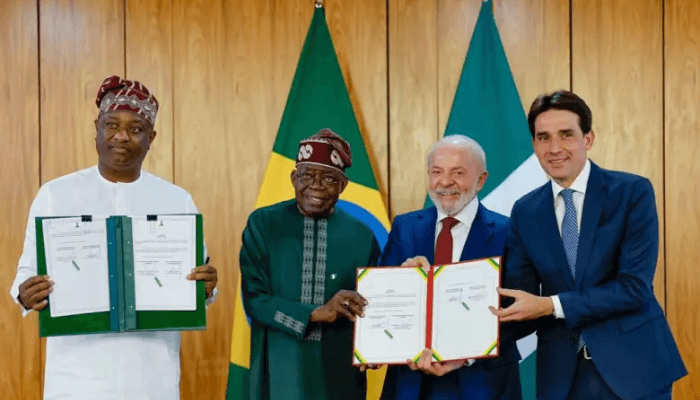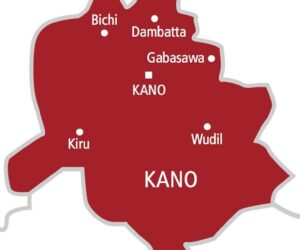Nigeria and Brazil recently signed the Bilateral Air Service Agreement (BASA), paving the way for stronger trade, tourism, and investment flows. The deal is also expected to boost people-to-people exchanges, deepen economic integration, strengthen cultural ties and improve diplomatic cooperation between the two nations.
President Bola Tinubu, accompanied by senior cabinet members – including Olawale Edun, minister of Finance and coordinating minister of the Economy; Bianca Ojukwu, minister of state for Foreign Affairs; Festus Keyamo, minister of Aviation and Aerospace Development, and Abubakar Kyari, minister of Agriculture and Food Security, among others – witnessed the signing of the Memorandum of Understanding (MOU).
Tinubu was received by Luiz Inácio Lula da Silva, Brazilian president, marking a step in strengthening bilateral ties between the two big economies in their respective continents.
However, BusinessDay’s checks show that this is not the first time Nigeria has signed BASA with Brazil as almost every Nigerian government visited Brazil for MOUs but without results.
Experts argue that the recent BASA is different as it immediately led to the announcement of direct flights between Nigeria and Brazil, which would be operated by Nigeria’s largest carrier, Air Peace.
Read also: Nigeria, Brazil ready for direct flights as Tinubu, Keyamo sign BASA
Odds against Nigerian airlines
Concerns have however been raised that since Brazil currently has no national or flag carrier currently operating into Nigeria, the rule of reciprocity may not apply. This could leave Air Peace at the mercy of Brazilian government, potentially forcing the airline to abide by wherever rules the country sets, irrespective of their profitability.
Also, the same challenges that have always shortened the lifespan of Nigerian airlines and kept several airlines away from international routes remain unresolved, with little or no efforts from government to address them.
For instance, high operating and maintenance costs are asphyxiating domestic airlines, putting pressure on their long-term sustainability.
Nigerian airlines are highly exposed to the foreign exchange (FX) as most of their transactions are carried out in dollars. And with the FX crunch in Nigeria, which has worsened in the last two years, airlines appear to be struggling to keep their planes in the sky.
Cost of operations are high, particularly as aircraft maintenance is done outside Nigeria. There are multiple taxation from government agencies, which are affecting airlines’ bottom-lines.
BusinessDay’s findings show that aviation fuel currently takes about 45 percent of operating cost; labour, 17 percent; aircraft rent and ownership, 8.5 percent; non-aircraft rents and ownership, seven percent; professional services, 4.5 percent; landing fees, two percent; food and beverage, 1.5 percent; maintenance materials, 13 percent, and transport related, 1.5 percent.
Past attempt
BusinessDay’s findings show that Varig was the first airline founded in Brazil in 1927. From 1965 until 1990, it was Brazil’s leading airline and virtually its only international one.
Varig launched the Lagos–Brazil route in 1977, connecting Nigeria and Brazil directly.
Direct flights between Nigeria and Brazil in the 1990s ended mainly because of problems with the Brazilian carrier, which had been the only airline operating that route.
Read also: Delta Air Lines 737’s wing breaks off during flight
By the early 1990s, Varig was under severe financial strain, as rising fuel costs, heavy debt, and competition forced it to scale back its long-haul network.
In 1994, as part of a broader restructuring, Varig withdrew from Lagos and other African destinations, labeling the businesses unprofitable.
Once Varig pulled out, no other airline stepped in to sustain the link, so direct flights between Nigeria and Brazil stopped.
However some have argued that the stoppage of Varig wasn’t due to political or diplomatic issues but was essentially a business decision tied to Varig’s financial troubles and route rationalisation.
Mixed feelings
While some stakeholders have described the BASA as a game changer, others say elements of sustainability are missing for Nigerian carriers in the value chain.
Samuel Caulcrick, former rector of the Nigerian College of Aviation Technology (NCAT), said BASA between Nigeria and Brazil is poised to be a game-changer, igniting economic integration, deepening cultural connections, and amplifying diplomatic ties between these two vibrant nations.
He noted that this agreement comes at a perfect time, aligning with the evolving trends in global tourism and paving the way for a surge in trade, investment, and travel between Nigeria and Brazil.
“It is a good opportunity to say goodbye to layovers. This agreement launches direct flights between bustling cities like Lagos, Abuja, São Paulo, and Rio de Janeiro, making travel seamless and convenient for passengers.
“Also, with enhanced air connectivity, we should expect an exhilarating uptick in bilateral trade, investment, and tourism—fueling economic growth in both Nigeria and Brazil,” he explained.
He noted that increased air travel will spark vibrant cultural exchanges, foster people-to-people diplomacy, and open doors for educational collaborations, highlighting the rich tapestry of Nigerian Brazilians.
Read also: 58 passengers denied boarding on British Airways Abuja-London flight over faulty door
Olumide Ohunayo, industry analyst and director of research at Zenith Travels, asked:
“How many Nigerians travel to Brazil? Where is the transit airport and commercial partnership that would make the Nigerian airline sustain operations on the route?”
He is not excited about the agreement, noting that it can only favour cargo business, not passengers.









